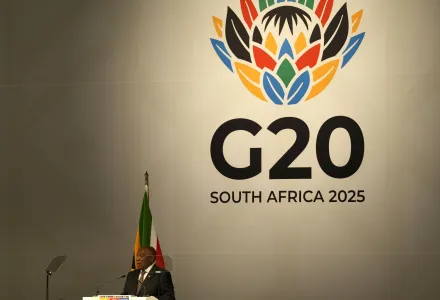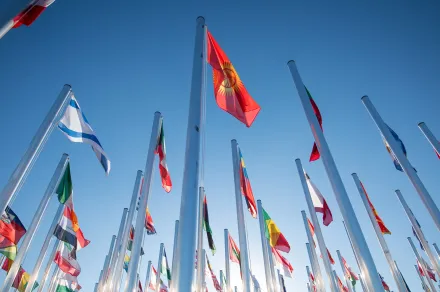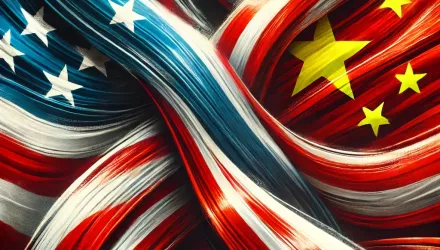What is the G20?
The Group of Twenty, or “G20,” is a loose organization of the world’s largest economies. Originally meant to be a forum for discussions on international economic and financial issues, today it also focuses on other global challenges such as climate change and global health.
Presidents, prime ministers, and other leaders from the G20 are gathering for the group’s annual summit on Nov. 22-23, 2025 in South Africa—the organization’s first ever summit on the African continent. The G20 is a forum to forge joint policies that allows emerging economies to express their views alongside the world’s largest economies. Yet its effectiveness faces serious challenges in a fragmented global order, as the U.S. boycott of the 2025 summit shows.
Today, there are 21 members total. This includes 19 countries and 2 international organizations:*
- African Union
- Argentina
- Australia
- Brazil
- Canada
- China
- European Union
- France
- Germany
- India
- Indonesia
- Italy
- Japan
- Mexico
- South Korea
- Russia
- Saudi Arabia
- South Africa
- Turkey
- United Kingdom
- United States
*Spain attends as a permanent guest.
History of the G20
The G20 was formed in response to the 1997-1998 Asian financial crisis as a way for finance ministers and central bank leaders to discuss global financial stability and economic policy. The forum is widely credited for its actions to address the 2008 financial crisis, including coordinated spending measures and financial system reforms, among other efforts.
The G20 Summit
The G20 Summit is the annual meeting of the members’ leaders where they discuss economic and political initiatives that have been developed over the course of smaller meetings throughout the year.
The theme for the 2025 G20 Summit is “Solidarity, Equality and Sustainability.” South Africa’s priorities for its presidency are as follows:
- Priority 1) Strengthening disaster resilience and response
- Priority 2) Taking action to ensure debt sustainability for low-income countries
- Priority 3) Mobilizing finance for a just energy transition
- Priority 4) Harnessing critical minerals for inclusive growth and sustainable development
G20 Presidency and Leadership
Each year members rotate serving as president of the G20. In December 2024, South Africa took over as president from Brazil. In December 2025, following this year’s summit in Johannesburg, the United States will take over as president.
What is the Role of the U.S. in the G20?
Historically, the U.S. has been an active member in the G20, but its participation has not been without contention. In 2022, the U.S. Treasury Secretary Janet Yellen, along with officials from several other countries, walked out of a G20 meeting to protest Russia’s participation due to its conflict with Ukraine.
During President Trump’s first term, the United States maintained a presence at G20 summits, though fractures were beginning to appear. The joint declaration resulting from the 2017 summit noted the United States’ withdrawal from the Paris Climate Agreement, highlighting a split between Washington and other G20 members. However, the declaration also appeared to concede to the U.S. posture on trade practices. This demonstrates that despite differences in policy, the United States was still able to wield considerable influence.
U.S. participation in meetings leading up to the 2025 summit demonstrate a growing distance once again. The New York Times reported that “the United States had spent much of the year drawing red lines, skipping working meetings and refusing to negotiate in the lead-up to the final gathering in Johannesburg.”
In early November, President Donald Trump said the United States would boycott the meeting, with no officials attending. He cited "human rights abuses" in South Africa, resurrecting his long-running charges that white South Africans are being killed and dispossessed of their land. South African President Cyril Ramaphosa responded to the U.S. plans by saying, "their loss".
How will the U.S. Role in the G20 Evolve?
Despite his stance on the South Africa gathering, President Trump has stated that he is looking forward to hosting next year's summit, scheduled for Dec. 14-15, 2026, in Miami, Florida.
He may seek to capitalize on the G20 presidency as an opportunity to cement his legacy as a dealmaker. This could include pursuing agreements that are led by the United States and favor its priorities, though the success of such a strategy may depend in part on his willingness to accommodate the other members.
Alternatively, President Trump may pursue a minimalist G20 agreement or even disregard the agreement after Miami. He could also cancel the summit or withdraw the United States from the forum, as he has done with other multilateral organizations and agreements such as the World Health Organization and the Paris Climate Agreement.
Were U.S. participation to remain uncertain or to end, the G20 would be weaker and would struggle to remain an effective body for consensus among the world’s largest economies. In a crisis, it may not have the influence and reach necessary to implement a coordinated international response.
How do Middle Power Countries Fit into the G20?
As they grow in influence, the “middle powers” in the group -- Brazil, India, Indonesia, Saudi Arabia, South Africa, and Turkey -- have the opportunity to take on a larger, more influential role within the G20.
These increasingly ambitious states are aiming to find a balance between alignment with the U.S. or China. In addition to trade, these countries seek the diplomatic backing and military support of superpowers while working to advance their own interests, including through partnerships with each other. Given that these middle powers were included in the G20 from the start and the rotating leadership style of the forum, the G20 provides a potential forum for these countries to advance their interests without fully aligning with the East or the West.





